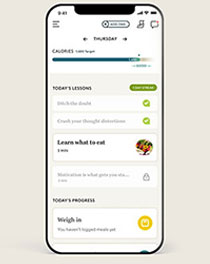
By clicking on the product links in this article, we may receive a commission fee at no cost to you, the reader. Sponsorships and affiliate commissions help support our research so we can help you find the best products. Read our full affiliate disclosure here.
Tight traps—almost everyone has them, and everyone knows how they feel.
It feels like you constantly have a weight on your shoulder. You feel tightness in your upper back, arms and neck. Sometimes, headaches develop from the tight muscles in your neck.
Tightness of the trapezius muscles affects many people in various situations. Maybe you've just started working out regularly. Maybe you have been doing too many overhead activities such as swimming or playing tennis. You might have carried heavy objects or been sitting in one position for a long period of time. Maybe you're just stressed.
Stop stressing over your diet. Re-train your brain and your relationship with food using NOOM:
Your trapezius muscle consists of three parts and has many different functions—lifting your shoulders, holding up your neck and head, and moving your shoulder blade. When this muscle is tight, it affects your entire body, as your biomechanics will change, and you may be searching for relief.
Tight traps are bound to happen. They're rarely serious enough to require medical attention, but they're significant enough to influence your training and overall well-being.
1. Check for Tightness Throughout the Day
Whether you're sitting at your desk or out for a run, periodically check where your shoulders are. Are they relaxed or are your traps contracted? Are you shrugging your shoulders?
In the ideal state, your shoulders should be in line with your collarbone—not higher or pushed forward. You can easily check this by simply letting your shoulders "fall." You may realize you have them in a shrugged position too often.
2. Do Shoulder Shrugs
To prevent your traps from tightening, and to release tension from the traps, do shoulder shrugs regularly throughout the day.
Exaggerate the movement by pulling your shoulders all the way to your ears, holding them there for a few seconds, and then letting them fall to a relaxed position. You can also loosen your traps by rolling your shoulders in both directions.
3. Stretch
Here's how to stretch tight traps, or those that may become tight after a long day of work or training:
- Positioning: You can do this sitting or standing. Always have your hand on the shoulder you want to stretch to prevent it from moving up. The other hand should be on top of your head with your fingers pointing towards the back. Your neck should always remain in line with your back and the only body part that is moving is your head
- Forward stretch: Gently pull your head forward with your chin toward your neck as if you were nodding. Hold this position for 10 to 15 seconds.
- Side stretch: Gently pull your head to the side so your ear approaches the opposite shoulder. Switch sides. Hold this position for 10 to 15 seconds.
- Diagonal stretch: Gently pull your head diagonally forward so your chin approaches the opposite shoulder. Hold this position for 10 to 15 seconds.
Repeat these stretches on the other side. Start with the forward stretch, but this time, your hand should be on the opposite shoulder. Go through these stretches 2 to 3 times in one sitting and repeat throughout the day.
4. Get a Massage or "Tennis-Ball" Your Traps
If you have the time and resources, get a massage. This will relieve you from tension and make you feel a lot better.
Don't have the budget flexibility for a massage? No problem. You can do it on your own. All you need is a wall and a tennis ball (it can also be any other ball or round durable item).
First, massage yourself by rolling the ball on your traps, with some pressure. You will feel how tight it is and there will likely be one spot that hurts the most. Wherever that spot is, stay there with your tennis ball and slightly push. Hold that for at least 90 seconds or until you feel a release of tension. Repeat this until you feel that they have gotten looser.
If you feel the tightness on the back, more in your middle traps and between your shoulder blades, you won’t need to do yoga exercises to reach there with the tennis ball. Find a wall and lean against it with the tennis ball between and roll up and down. Again, when you find a tough spot, stay there for a while. Repeat the rolling until you feel the tension ease.
Since massages also aid in the release of toxins back into the bloodstream, be sure to drink plenty of water after.
Follow these guidelines to get rid of tight traps faster and return to your daily activities. It'll be like a weight lifted off your shoulders.
Connect with us on Twitter, Facebook, Instagram or Pinterest for more tips, recipes and ideas to fuel your ACTIVE life.
 Stay in shape in a fitness class or read more fitness articles.
Stay in shape in a fitness class or read more fitness articles.



